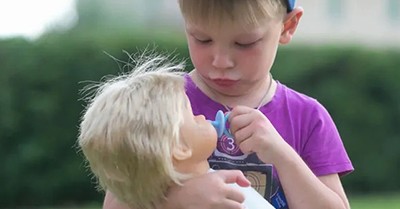In many early childhood settings, we celebrate children's creativity, imagination, and emotional expression—until gendered assumptions silently step in. A boy cradling a doll may still prompt side glances, teasing, or even misguided redirection. But it's time we call out this outdated thinking and reaffirm our professional responsibility: nurturing all children’s capacity for empathy, care, and meaningful connection.
Doll Play Is Developmentally Powerful—for Every Child
Research and practice both affirm that doll play:
- Builds emotional literacy through pretend caregiving, dialogue, and comfort rituals
- Supports empathy and social negotiation, especially in group settings
- Invites role play that reflects diverse family structures and real-world identities
- Lays groundwork for future nurturing roles—as brothers, fathers, educators, nurses, or allies
Yet boys are often nudged toward action play, construction, or “masculine” character toys, reinforcing narrow expectations that harm long-term development and well-being.
Busting Myths
Myth 1: “Doll play is just for girls”
Truth: Doll play supports every child’s emotional and social development. Through pretend caregiving, children build empathy, communication skills, and an understanding of relationships. Boys who play with dolls tend to be more emotionally attuned and caring in later life.
Myth 2: “Playing with dolls will confuse his gender”
Truth: Exploring roles and relationships through play does not influence a child’s gender identity. It simply provides a safe, creative outlet to experiment with emotions, stories, and care-based roles—something all children need.
Myth 3: “He should play with ‘boy toys’”
Truth: Children benefit from a full range of play experiences—from building blocks to baby bottles. Limiting play options based on gender reduces creativity and resilience. Diverse play leads to well-rounded development.
The Gendered Gaze: Unpacking Our Bias
Educators must reflect on questions like
- Do we unconsciously steer boys away from dolls or kitchen play?
- Are our dramatic play setups gender-neutral, inclusive, and culturally responsive?
- Do our comments, facial expressions, or resource choices unintentionally reinforce stereotypes?
This isn’t about banning trucks—it’s about making space for tenderness, storytelling, and caregiving across all identities. Children are watching what we normalise.
From Intent to Action: Sector Strategies
Let’s champion inclusive play by:
- Providing diverse dolls (skin tones, abilities, cultural dress, gender expressions)
- Embedding relationship play prompts that centre caregiving, comfort, and family roles
- Celebrating boys’ engagement through photos, storytelling, and child-led display walls
- Offering parent info sheets that address gendered myths with research-backed reassurance
- Training educators to recognize and challenge their own bias using micro-moment reflections
Children learn early who society values and how they’re expected to behave. Limiting boys’ ability to express care or vulnerability is a safeguarding concern—because emotional suppression, peer policing, and gendered shame have lifelong ripple effects.
As educators, we’re not just shaping play. We’re shaping futures.







 As an Educator in Australia, your pay rate falls under the Children’s Services Award 2010. This award states the minimum amount that an employer can
As an Educator in Australia, your pay rate falls under the Children’s Services Award 2010. This award states the minimum amount that an employer can When working as a qualified Early Childhood Teacher (with a university degree) within a service, your rate of pay will come from the Educational Services
When working as a qualified Early Childhood Teacher (with a university degree) within a service, your rate of pay will come from the Educational Services When working as a Diploma Qualified Educator your pay rate is from the Children's Services Award 2010. This Award states your minimum rate of pay
When working as a Diploma Qualified Educator your pay rate is from the Children's Services Award 2010. This Award states your minimum rate of pay When working as a Cert 3 Qualified Educator, your pay rate is from the Children's Services Award 2010. This Award states your minimum rate of
When working as a Cert 3 Qualified Educator, your pay rate is from the Children's Services Award 2010. This Award states your minimum rate of Educational Leaders play a crucial role in their early childhood service by ensuring that the educational program aligns with best practices and supports the holistic
Educational Leaders play a crucial role in their early childhood service by ensuring that the educational program aligns with best practices and supports the holistic In early childhood education and care, ratios are more than a technicality—they are a frontline safeguard. Every child deserves responsive supervision, emotional connection, and developmental
In early childhood education and care, ratios are more than a technicality—they are a frontline safeguard. Every child deserves responsive supervision, emotional connection, and developmental With the new national child safety reforms kicking in on 1 September 2025, early childhood services like yours have a real opportunity to lead the
With the new national child safety reforms kicking in on 1 September 2025, early childhood services like yours have a real opportunity to lead the Here’s a comprehensive Mobile Phone and Smart Watch Policy tailored for early childhood education and care (ECEC) services in Australia, aligned with the latest 2025
Here’s a comprehensive Mobile Phone and Smart Watch Policy tailored for early childhood education and care (ECEC) services in Australia, aligned with the latest 2025 The Sea of Fish Challenge is a national initiative that invites children, educators, families, and communities to create and display fish artworks as a symbol
The Sea of Fish Challenge is a national initiative that invites children, educators, families, and communities to create and display fish artworks as a symbol Across the early childhood education and care sector, educators are sounding the alarm: current staffing ratios are insufficient to deliver safe, meaningful, and developmentally appropriate
Across the early childhood education and care sector, educators are sounding the alarm: current staffing ratios are insufficient to deliver safe, meaningful, and developmentally appropriate


